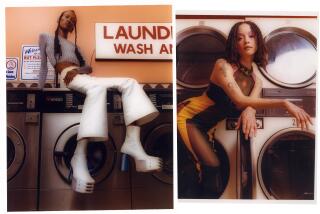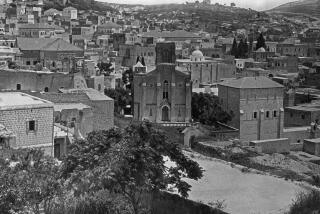Some Postcards From a Moroccan Carpet Ride
- Share via
MARRAKECH, Morocco — We had barely arrived when we encountered Morocco’s famous hospitality.
Andrea and I were riding the train from the seaport of Casablanca to this ancient city in the middle of the country. We had flown across the Mediterranean Sea from Spain, and after two months in Europe it was good to again be somewhere exotic.
A smiling bear of a man, dressed neatly in slacks and a shirt, plopped down next to me, and we chatted for much of the four-hour trip to Marrakech.
Abdellatif was returning from Rabat, the capital, where he’d been on business. He said he worked for the government, exporting Moroccan handicrafts. Hearing we were from California, he said his agency had clients in Palm Springs.
Before boarding the train, Andrea and I had phoned ahead for a hotel reservation, but our top choices were full. Abdellatif suggested a mid-range hotel that he knew we’d prefer to the one we had settled for. He told us to pay no more than $2 for the taxi there, named a good restaurant and warned us against pickpockets. We felt lucky to meet such a helpful, English-speaking local. As the train pulled into the red-colored city, he asked us to join him for breakfast the next day. We quickly agreed.
Andrea and I dined that night at Argana, the rooftop cafe Abdellatif had recommended. We looked down on the Jema al-Fna, the medina’s main square, where snake charmers, fire eaters, musicians and acrobats compete for coins. I instantly liked Morocco--its dreamy landscapes, its trippy vibe, its people who hold hand to heart and say, “Welcome.”
Only one thing bothered me. I caught myself questioning Abdellatif’s motives. Suspicion has become second nature on this trip. When someone tries to befriend me, especially in poorer countries, I assume he’s working an angle. Sadly, I’ve learned that this mistrust is usually warranted.
But I have my baloney radar turned up so high that I can’t tell when an authentic cultural exchange is unfolding. I had no reason to suspect Abdellatif. His travel tips were good; he gave no hint of wanting a thing from us. Why couldn’t his invitation to breakfast be a simple gesture of goodwill? I went to bed wondering how I’d turned so cynical.
Abdellatif had said the breakfast place was hard to find, so we met at a cafe on the square. I felt guilty about my earlier doubts as soon as I saw him. He rose from the table, beaming, shook our hands and patted me on the shoulder. He introduced us to a government colleague, Ayub, who would lead us to the restaurant; Abdellatif would join us shortly. We followed Ayub into the souk, a maze of twisting alleys. Deep inside the labyrinth, he abruptly turned right.
There’s a scene in “Goodfellas” when the mobster played by Joe Pesci thinks he’s being escorted to the Mafia ceremony that will make him a made man, but instead he gets whacked. When he realizes what he’s walked into, he groans, “Oh, no.” That’s how I felt when Ayub led us into the carpet store. No restaurant, just a carpet store. The great Moroccan cliche. And the hit men lying in wait.
Abdellatif appeared. “Have you eaten yet?” he asked. I shook my head. “That’s good because we have camel meat. Fresh, very fresh.” He ushered us upstairs, and for a moment I hoped I’d misread the situation. All doubt vanished when I saw the breakfast nook: the end of a long, narrow, windowless room filled with expensive, hand-woven carpets.
We were joined by Aziz, the closer. He and Abdellatif spoke Arabic, although both are fluent in English. Andrea and I felt caged, a pair of pigeons nibbling camel meat. Abdellatif ate quickly and departed, his job apparently done. Another man entered and unrolled carpets as Aziz started his pitch.
“We didn’t come here to buy a carpet,” Andrea said.
“Nobody does, madam,” Aziz said, smiling. “It’s always love at first sight.”
I mentally replayed our encounter with Abdellatif on the train. He said he’d been away from Marrakech three days, but he carried no luggage. The conductor checked the ticket of every passenger in the compartment but his, as if he had been seated elsewhere. When I asked about the government program, he was vague. It wasn’t a leap to now conclude he had been trolling the train for suckers.
Aziz continued his rap: “Don’t worry about price, I make you a good deal. . . . I don’t want to push you, I want to encourage you. . . .”
More carpets were unrolled. If Andrea even glanced at one, Aziz set it aside. Amid the flurry of colors and designs, a red wool number caught her eye. Andrea might buy a $2,000 carpet, but not without comparing prices and checking our room dimensions at home. She said she would think about it. Aziz insisted on putting the carpet on hold for her. He told her to return even if she didn’t want it, so he could sell it. Andrea said if a buyer wanted it, let it go; she needed time.
Abdellatif, who had reappeared, now sat off to the side. Looking sullen, he said an afternoon was long enough to think, and that Andrea should return that night with her answer. She again urged him not to hold the carpet. “We said we’d set it aside,” Abdellatif snapped. “We’re honest. I don’t know if you are.” It was a curious comment considering how we had gotten to his store. We kept our word and returned the next day to refuse the carpet.
By then I was grappling with the meaning of the whole sorry episode. It stings to think you’re too cynical, then learn you’re not cynical enough. I could see my experience with Abdellatif as an isolated incident, or I could see it as one of the dark truths of travel. Instead, I simply swept it under the rug.
*
NEXT WEEK: Through the desert, by car and camel.
*
Did you miss a Wander Year installment? The entire series since it began in January can be found on The Times’ Web site at https://www.latimes.com/travel/wander.
More to Read
Sign up for The Wild
We’ll help you find the best places to hike, bike and run, as well as the perfect silent spots for meditation and yoga.
You may occasionally receive promotional content from the Los Angeles Times.
![LOS ANGELES, CA - JUNE 17: [Cody Ma and Misha Sesar share a few dishes from their Persian Restaurant Azizam] on Monday, June 17, 2024 in Los Angeles, CA. (Ethan Benavidez / For The Times)](https://ca-times.brightspotcdn.com/dims4/default/7ffc7f6/2147483647/strip/true/crop/5110x3417+306+0/resize/320x214!/quality/75/?url=https%3A%2F%2Fcalifornia-times-brightspot.s3.amazonaws.com%2F79%2Fdc%2F4d29255545f5b9813315901692bc%2F1459972-fo-azizam-review20-eba.JPG)





